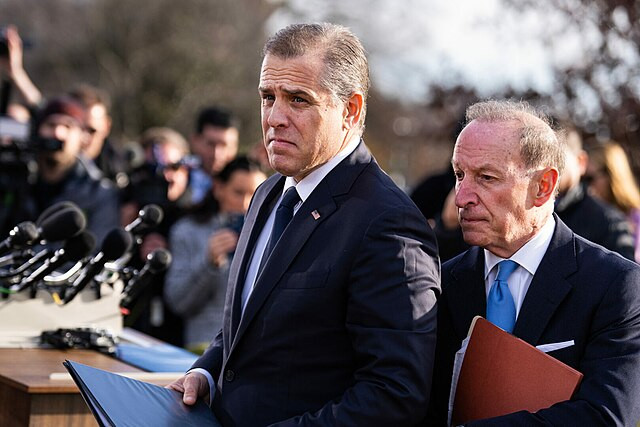Hunter Biden, the son of President Joe Biden, pleaded guilty on Thursday to nine federal tax charges. This surprising decision, made in a Los Angeles federal court, allows him to avoid what would have been a highly publicized and potentially embarrassing trial. Biden's guilty plea has drawn significant attention, not only for its legal implications but also for the personal motivations he shared in a statement released shortly after the court proceedings.
Hunter Biden, 54, expressed that his primary reason for pleading guilty was to protect his family from the intense public scrutiny and humiliation that a trial would inevitably bring. "I went to trial in Delaware not realizing the anguish it would cause my family, and I will not put them through it again," Biden stated. "When it became clear to me that the same prosecutors were focused not on justice but on dehumanizing me for my actions during my addiction, there was only one path left for me."
The charges against Biden stem from his failure to pay over $1.4 million in federal taxes between 2016 and 2019. According to the indictment filed by Special Counsel David Weiss, Biden not only failed to pay his taxes but also filed false tax returns during this period. The indictment paints a picture of a man struggling with addiction, using his income to fund a lavish lifestyle rather than fulfilling his tax obligations.
Biden's plea was an "open plea," meaning he admitted guilt to all charges without any pre-arranged agreement on sentencing from prosecutors. This approach leaves his fate entirely in the hands of U.S. District Judge Mark C. Scarsi, who will determine Biden's sentence at a hearing scheduled for December 16. Despite the charges carrying a maximum penalty of 17 years in prison, legal experts suggest that actual sentences for federal crimes are often less severe than the maximum penalties.
Biden's attorney, Abbe Lowell, spoke to reporters after the plea, framing his client's decision as an act of love and courage. "Hunter put his family first today. And it was a brave and loving thing to do," Lowell said. He emphasized that the plea prevented a "show trial" that would have lacked fairness and failed to present the full context of Biden's actions during his struggle with addiction.
The court proceedings were not without drama. Earlier in the day, Biden attempted to enter an Alford plea, where a defendant maintains their innocence but acknowledges that the evidence is likely strong enough to convict. However, prosecutors opposed this plea, arguing that it was "not in the public interest" and inconsistent with the rule of law. Faced with this opposition, Biden ultimately chose to plead guilty outright, accepting full responsibility for his actions.
In his statement, Biden reflected on the impact of his addiction on his life and decisions. "Like millions of Americans, I failed to file and pay my taxes on time. For that I am responsible," he said. "Addiction is not an excuse, but it is an explanation for some of my failures at issue in this case." Biden also emphasized that he had since paid all his back taxes, including penalties, before the charges were brought against him.
The case against Biden has been highly unusual, not only because of his status as the son of a sitting president but also due to the nature of the charges. Prosecutors allege that Biden engaged in a "four-year scheme" to evade paying taxes, using his income for personal indulgences rather than fulfilling his legal obligations. The indictment detailed expenses that included payments to escorts, luxury hotels, and even a sex club membership, all falsely claimed as business expenses.
Despite the guilty plea, Biden's legal team is preparing for the next phase of the legal battle. Lowell indicated that they would explore all options for appeal, particularly in light of the unique aspects of the case. "This case was an extreme and unusual one for the government to bring," Lowell argued, suggesting that Biden was unfairly targeted for actions that many Americans could relate to.
The implications of Biden's plea reach beyond the courtroom. As the first son of a sitting president to face such charges, the case has become a focal point for critics of the Biden administration. President Joe Biden has consistently stated that he will not use his presidential power to pardon his son, a position reaffirmed by White House press secretary Karine Jean-Pierre following the plea. "It's still no," she said when asked if the president would consider a pardon.
The plea marks a significant chapter in Hunter Biden's tumultuous life, one that has been marked by public struggles with addiction, legal troubles, and intense media scrutiny. As he awaits sentencing, Biden's statement offered a note of hope for others battling addiction: "For anyone now going through the scourge of addiction, please know there is a light at the end of that seemingly endless tunnel. I was where you are now. Don't quit right before the miracle."






